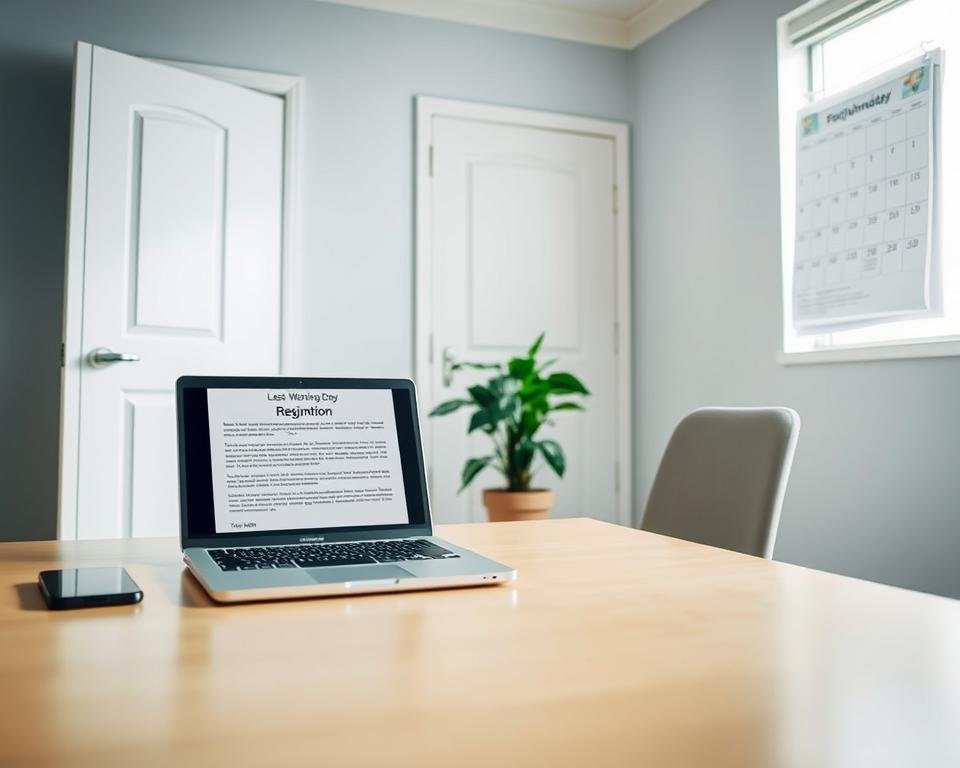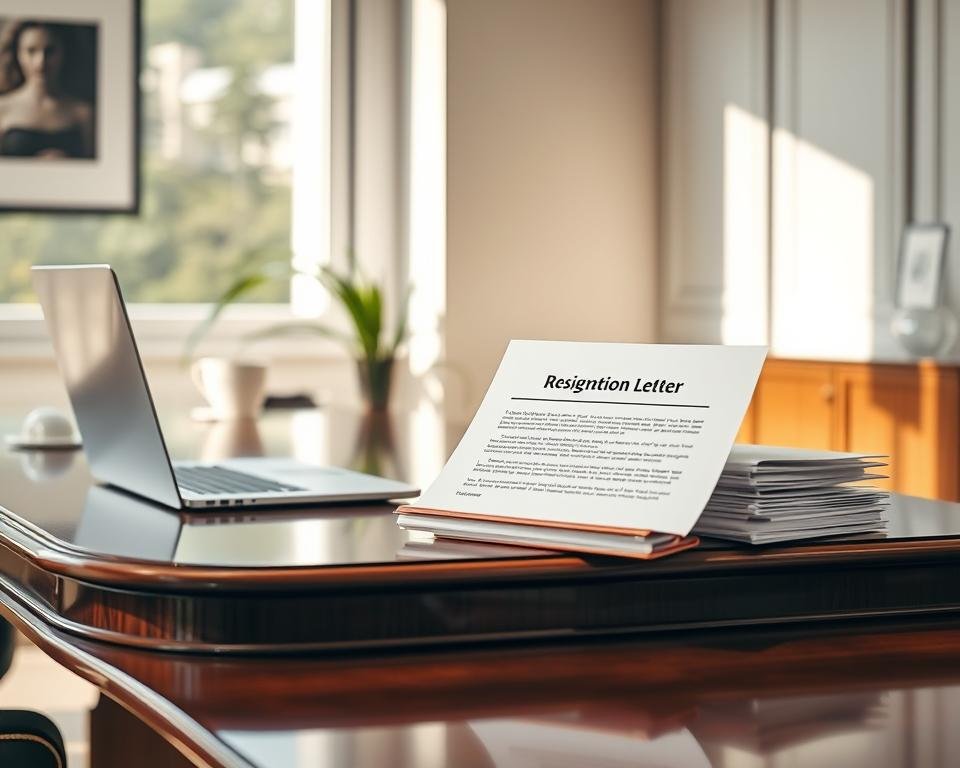Quitting a job is a big step, both in your career and personal life. It’s important to do it thoughtfully and professionally. This way, you keep good relationships and your reputation intact. In the U.S., people usually have 12 jobs in their lifetime, says the Bureau of Labor Statistics.
Before you quit, make sure you have a good reason. It could be for a new career or a better job offer. Don’t rush into it. Talk to your family and friends first. Having a new job lined up can make the transition easier and more secure.
When you decide to leave, give at least two weeks’ notice. Some contracts might ask for more. It’s best to quit in person to show respect and keep communication open. Helping train your replacement can also make your leaving smoother.
Don’t tell your coworkers about your plans before talking to your boss. This keeps your relationship with the company strong. It shows you’re committed to a smooth transition.
Planning Your Exit Strategy Before Resignation
Before you quit, it’s key to evaluate your current job and future career goals. Think about your skills, experience, and growth chances in your current company. This will help you see if your job fits your long-term career goals.
After figuring out your career dreams, it’s time to find a new job before leaving your current one. This step ensures you have money during the changeover and leaves your current job on good terms. Look for jobs, update your resume, and network to find the right fit for your exit plan and job search.
Financial Preparation and Timeline Planning
When leaving your job, it’s vital to plan your financial timeline and prepare. Make a budget for your living costs, debts, and any income gaps during the transition. Check your savings and see how long you can last financially before your new job starts.
- Evaluate your current financial situation and expenses
- Determine the minimum income required to cover your costs
- Set a realistic timeline for your financial planning and job search
By planning your exit strategy, checking your goals, and getting your finances in order, you’ll be ready for a smooth transition to your next job.
How to Quit Your Job: Essential Steps for a Professional Exit
Deciding to leave a job is a big choice. It’s important to do it with respect and integrity. By following key steps, you can leave on good terms, keeping your relationships and career future bright.
- Provide a Respectable Reason for Leaving: Talk about positive reasons like looking for new challenges or wanting a better work-life balance. Don’t speak badly about your current job or colleagues.
- Draft a Formal Resignation Letter: Write a professional resignation letter with your last day, thanks, and a good tone. This guide has tips for a great letter.
- Be Prepared for Various Situations: Think about possible counteroffers or questions. Have a thoughtful answer ready. Stay positive during the whole process.
- Resign in Person When Possible: If you can, meet with your manager to talk about leaving. It shows respect and leads to a better conversation.
- Give Adequate Notice: A two-week notice is the usual standard. It lets your employer adjust and ensures a smooth transition.
- Offer to Train Your Replacement: If someone needs to take your place, offer to help train them. This shows you care about the team’s success.
- Inform Close Coworkers Personally: After telling your manager, tell your close colleagues personally. It keeps relationships strong and lets you say goodbye.
By following these resignation steps, you can leave your job professionally. This keeps your workplace etiquette in check. Being professional and respectful now can help your future career.

“Leaving a job well can be just as important as landing a new one. The way you exit can impact your future prospects and relationships.”
Crafting a Professional Resignation Letter
Leaving a job is a big step, and your resignation letter is key. It’s important to be clear and respectful. Your letter should state your resignation, the date you’ll leave, and why you’re leaving. It should also thank your employer.
Key Components of an Effective Resignation Letter
An effective resignation letter has a few important parts:
- A brief introduction stating your intent to resign from your position
- A clear statement of your resignation, including the last day of work
- A concise explanation for your departure, focusing on the positive
- A message of appreciation and gratitude for the opportunities provided
- An offer to assist with the transition and knowledge transfer, if appropriate
Templates and Best Practices
To make your resignation letter professional, follow these tips:
- Address the letter directly to your immediate supervisor or manager
- Maintain a positive and appreciative tone throughout the letter
- Keep the letter concise and focused, avoiding excessive details or complaints
- Proofread the letter carefully for any errors or typos
- Offer to assist in the transition process, if possible, to maintain a good relationship
Proper Formatting and Tone
Your resignation letter should show your professionalism and respect. Use the standard business letter format and a formal tone. Stay away from emotional language and complaints. Instead, focus on being thankful and leaving on good terms.
“Keeping your resignation letter professional and polite is key to a good reputation.”
Writing a thoughtful resignation letter shows your employee rights and professionalism. It also keeps your professional communication with your employer strong during this change.
Announcing Your Departure to Management
When you decide to leave your job, how you tell your boss matters a lot. The resignation announcement is a key part of leaving well. It’s important to think about it carefully.
Start by setting up a meeting with your boss to talk about leaving. Be positive and ready for any reaction, like a counter-offer. Stay professional and focus on why you’re leaving, not the bad parts of your job.
- Thank your company for the chances and lessons you’ve learned.
- Offer to help with the transition and training of your replacement.
- Be clear about your last day, usually two weeks’ notice is best.
After talking to your boss, write a formal resignation letter that covers the main points. This letter is a key part of leaving well. It helps make your exit smooth and professional.
“Leaving a job is never easy, but handling it with grace and professionalism can open doors for future opportunities.”
How you announce your resignation affects your future work relationships and reputation. Be careful and stay positive during this time.

Managing the Notice Period Successfully
When you decide to leave a job, the notice period is key. It usually lasts two weeks, but some give more time. Resigning is a delicate step, and doing it well can make a great impression.
Creating a Detailed Transition Plan
Creating a detailed plan is vital during this time. It should cover your current tasks, projects, and key info for your replacement. This helps in smoothly passing on your work.
Documentation and Knowledge Transfer
It’s important to document your work and organize files for easy handover. Make a list of passwords and access info for systems. Also, plan sessions to share your knowledge with your team.
Training Replacement if Required
If you have time, training your replacement is a good idea. It shows you care about the team’s success. Give them hands-on training and documents to help them take over.
Work hard and stay professional during the notice period. Keep your team updated on your projects. This way, you ensure a smooth employee transition. By doing this, you leave a positive mark and help the company thrive.
“Leaving a job gracefully can open doors to future opportunities and collaborations.”
Maintaining Professional Relationships
When you’re leaving your job, it’s key to keep good relations with your coworkers and bosses. Your professional network is important for future chances. So, swap contact info with those you want to stay in touch with. Also, connect on LinkedIn to grow your professional circle.
Don’t burn bridges. Your industry connections are small, and keeping a good reputation is vital for your career. Say thank you to mentors and supportive colleagues. You can also offer to be a reference or recommend them in the future.
If your team has a farewell event, try to be there. It’s a chance to thank them for the time you’ve shared. On your last day, send a heartfelt goodbye email. Express your thanks for the chance to work with them and the lessons you’ve learned. Keeping these relationships open can lead to new collaborations, referrals, or even job opportunities in the future.